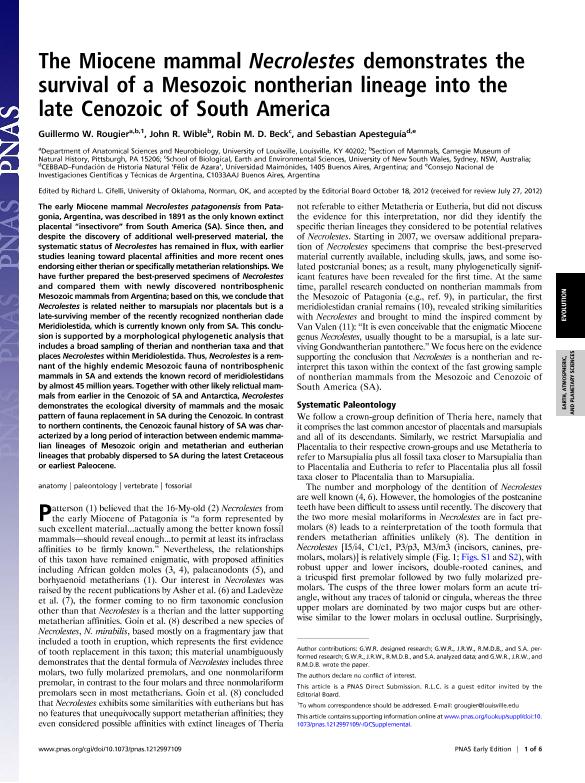Mostrar el registro sencillo del ítem
dc.contributor.author
Rougier, Guillermo W.
dc.contributor.author
Wible, John R.
dc.contributor.author
Beck, Robin M. D.
dc.contributor.author
Apesteguía, Sebastián

dc.date.available
2023-06-05T18:26:27Z
dc.date.issued
2012-12
dc.identifier.citation
Rougier, Guillermo W.; Wible, John R.; Beck, Robin M. D.; Apesteguía, Sebastián; The Miocene mammal Necrolestes demonstrates the survival of a Mesozoic nontherian lineage into the late Cenozoic of South America; National Academy of Sciences; Proceedings of the National Academy of Sciences of The United States of America; 109; 49; 12-2012; 20053-20058
dc.identifier.issn
0027-8424
dc.identifier.uri
http://hdl.handle.net/11336/199607
dc.description.abstract
The early Miocene mammal Necrolestes patagonensis from Patagonia, Argentina, was described in 1891 as the only known extinct placental "insectivore" from South America (SA). Since then, and despite the discovery of additional well-preserved material, the systematic status of Necrolestes has remained in flux, with earlier studies leaning toward placental affinities and more recent ones endorsing either therian or specifically metatherian relationships. We have further prepared the best-preserved specimens of Necrolestes and compared them with newly discovered nontribosphenic Mesozoic mammals from Argentina; based on this, we conclude that Necrolestes is related neither to marsupials nor placentals but is a late-surviving member of the recently recognized nontherian clade Meridiolestida, which is currently known only from SA. This conclusion is supported by a morphological phylogenetic analysis that includes a broad sampling of therian and nontherian taxa and that places Necrolestes within Meridiolestida. Thus, Necrolestes is a remnant of the highly endemic Mesozoic fauna of nontribosphenic mammals in SA and extends the known record of meridiolestidans by almost 45 million years. Together with other likely relictual mammals from earlier in the Cenozoic of SA and Antarctica, Necrolestes demonstrates the ecological diversity of mammals and the mosaic pattern of fauna replacement in SA during the Cenozoic. In contrast to northern continents, the Cenozoic faunal history of SA was characterized by a long period of interaction between endemic mammalian lineages of Mesozoic origin and metatherian and eutherian lineages that probably dispersed to SA during the latest Cretaceous or earliest Paleocene.
dc.format
application/pdf
dc.language.iso
eng
dc.publisher
National Academy of Sciences

dc.rights
info:eu-repo/semantics/openAccess
dc.rights.uri
https://creativecommons.org/licenses/by-nc-sa/2.5/ar/
dc.subject
ANATOMY
dc.subject
FOSSORIAL
dc.subject
PALEONTOLOGY
dc.subject
VERTEBRATE
dc.subject.classification
Paleontología

dc.subject.classification
Ciencias de la Tierra y relacionadas con el Medio Ambiente

dc.subject.classification
CIENCIAS NATURALES Y EXACTAS

dc.title
The Miocene mammal Necrolestes demonstrates the survival of a Mesozoic nontherian lineage into the late Cenozoic of South America
dc.type
info:eu-repo/semantics/article
dc.type
info:ar-repo/semantics/artículo
dc.type
info:eu-repo/semantics/publishedVersion
dc.date.updated
2023-05-19T10:54:46Z
dc.journal.volume
109
dc.journal.number
49
dc.journal.pagination
20053-20058
dc.journal.pais
Estados Unidos

dc.journal.ciudad
Washington D.C
dc.description.fil
Fil: Rougier, Guillermo W.. University of Louisville; Estados Unidos. Carnegie Museum Of Natural History; Estados Unidos
dc.description.fil
Fil: Wible, John R.. Carnegie Museum Of Natural History; Estados Unidos
dc.description.fil
Fil: Beck, Robin M. D.. University of New South Wales; Australia
dc.description.fil
Fil: Apesteguía, Sebastián. Consejo Nacional de Investigaciones Científicas y Técnicas; Argentina. Universidad Maimónides. Área de Investigaciones Biomédicas y Biotecnológicas. Centro de Estudios Biomédicos, Biotecnológicos, Ambientales y de Diagnóstico; Argentina
dc.journal.title
Proceedings of the National Academy of Sciences of The United States of America

dc.relation.alternativeid
info:eu-repo/semantics/altIdentifier/url/https://www.pnas.org/doi/10.1073/pnas.1212997109
dc.relation.alternativeid
info:eu-repo/semantics/altIdentifier/doi/https://doi.org/10.1073/pnas.1212997109
Archivos asociados
